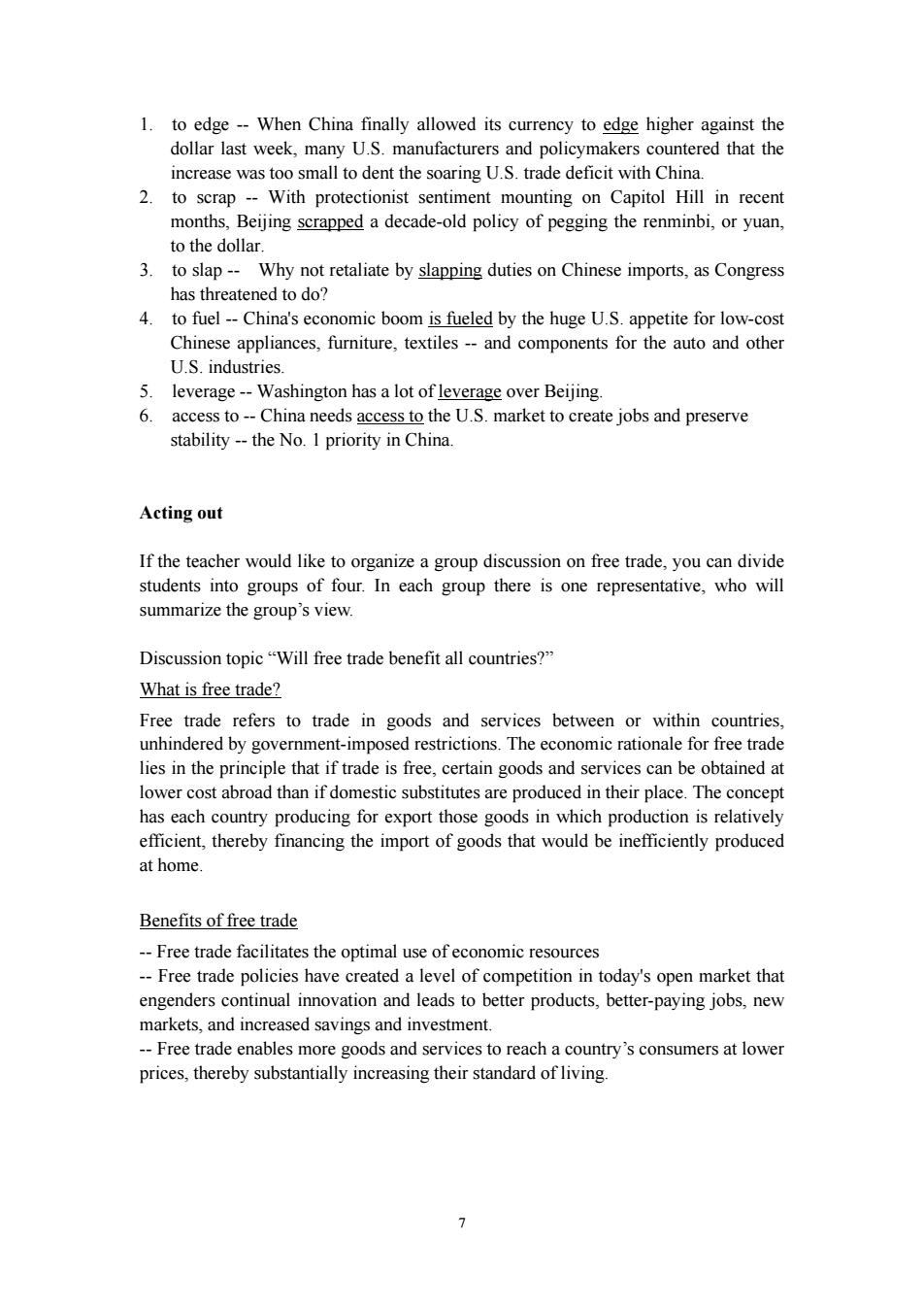正在加载图片...

1.to edge--When China finally allowed its currency to edge higher against the dollar last week,many U.S.manufacturers and policymakers countered that the increase was too small to dent the soaring U.S.trade deficit with China. 2.to scrap--With protectionist sentiment mounting on Capitol Hill in recent months,Beijing scrapped a decade-old policy of pegging the renminbi,or yuan, to the dollar. 3.to slap--Why not retaliate by slapping duties on Chinese imports,as Congress has threatened to do? 4.to fuel--China's economic boom is fueled by the huge U.S.appetite for low-cost Chinese appliances,furniture,textiles--and components for the auto and other U.S.industries. 5.leverage--Washington has a lot of leverage over Beijing 6 access to--China needs access to the U.S.market to create jobs and preserve stability--the No.1 priority in China. Acting out If the teacher would like to organize a group discussion on free trade,you can divide students into groups of four.In each group there is one representative,who will summarize the group's view. Discussion topic "Will free trade benefit all countries?" What is free trade? Free trade refers to trade in goods and services between or within countries, unhindered by government-imposed restrictions.The economic rationale for free trade lies in the principle that if trade is free,certain goods and services can be obtained at lower cost abroad than if domestic substitutes are produced in their place.The concept has each country producing for export those goods in which production is relatively efficient,thereby financing the import of goods that would be inefficiently produced at home. Benefits of free trade --Free trade facilitates the optimal use of economic resources --Free trade policies have created a level of competition in today's open market that engenders continual innovation and leads to better products,better-paying jobs,new markets,and increased savings and investment. --Free trade enables more goods and services to reach a country's consumers at lower prices,thereby substantially increasing their standard of living.1. to edge -- When China finally allowed its currency to edge higher against the dollar last week, many U.S. manufacturers and policymakers countered that the increase was too small to dent the soaring U.S. trade deficit with China. 2. to scrap -- With protectionist sentiment mounting on Capitol Hill in recent months, Beijing scrapped a decade-old policy of pegging the renminbi, or yuan, to the dollar. 3. to slap -- Why not retaliate by slapping duties on Chinese imports, as Congress has threatened to do? 4. to fuel -- China's economic boom is fueled by the huge U.S. appetite for low-cost Chinese appliances, furniture, textiles -- and components for the auto and other U.S. industries. 5. leverage -- Washington has a lot of leverage over Beijing. 6. access to -- China needs access to the U.S. market to create jobs and preserve stability -- the No. 1 priority in China. Acting out If the teacher would like to organize a group discussion on free trade, you can divide students into groups of four. In each group there is one representative, who will summarize the group’s view. Discussion topic “Will free trade benefit all countries?” What is free trade? Free trade refers to trade in goods and services between or within countries, unhindered by government-imposed restrictions. The economic rationale for free trade lies in the principle that if trade is free, certain goods and services can be obtained at lower cost abroad than if domestic substitutes are produced in their place. The concept has each country producing for export those goods in which production is relatively efficient, thereby financing the import of goods that would be inefficiently produced at home. Benefits of free trade -- Free trade facilitates the optimal use of economic resources -- Free trade policies have created a level of competition in today's open market that engenders continual innovation and leads to better products, better-paying jobs, new markets, and increased savings and investment. -- Free trade enables more goods and services to reach a country’s consumers at lower prices, thereby substantially increasing their standard of living. 7